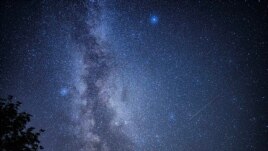20 October 2023
Australian researchers say they have produced the most complete history of the universe to date. An Australian National University team says the study offers new ideas about how the universe might have started.
The research team says the study's aim was to understand the beginnings of all the objects in the universe.
The American space agency, NASA, says the universe "includes all of space, and all the matter and energy that space contains. It even includes time itself and, of course, it includes you."

FILE - A picture taken in Fontainebleau, southern Paris on August 13, 2023 shows shooting stars streaking across the Milky Way during the "Nuits des étoiles" (Starry Night), a major annual celebration for astronomy enthusiasts. (Photo by Miguel MEDINA / AFP)
NASA adds that "the Milky Way is but one of billions of galaxies in the observable universe -- all of them, including our own, are thought to have supermassive black holes at their centers."
A black hole is an area in space with gravity so strong that even light cannot escape it.
The Australian team says it has created the most complete maps showing the history of the universe.
The lead writer is honorary professor Charley Lineweaver. He said that when the universe began 13.8 billion years ago in a hot big bang, there were no objects, such as atoms, people, planets, stars, or galaxies.
The writers say the mapping provides new ideas about how the universe came into being.
The Australian National University (ANU) study is published in the most recent publication of The American Journal of Physics.
The first map shows temperature and density of the universe as it expanded and cooled. The second map shows the mass and size of all objects in the universe.
The ANU researchers say the study suggests the universe may have started as what is known as an instanton not a singularity. An instanton has a defined size and mass. A singularity is defined as a point of infinite density and temperature.
Put simply, this would mean that the beginning of the universe was not infinite in size. That is important because researchers say that what lies beyond the limits of the universe is "also a major mystery."
Lineweaver told VOA that mapping the universe will increase our understanding of it.
"When you extrapolate in so many different ways it gives you just a lay of the land that I just think is a beautiful way of understanding the universe," he said. "If there is one way to understand the Big Bang, it started out hot and dense and it got cooler and less dense, and as it did that, particles and objects of all kinds condensed out of this hot, dense background."
He said that understanding that is something that we should all make an attempt to do because that is probably the most important understanding underlying the history of the universe.
Lineweaver says he believes that research into the beginning of the universe could help to answer some basic scientific questions about life beyond Earth.
"The basic idea is, well, if we can figure out how we got here, maybe we can make better guesses about whether other life forms have evolved elsewhere."
I'm Gregory Stachel.
Phil Mercer reported this story for Voice of America. Gregory Stachel adapted the story for VOA Learning English.
_______________________________________________
Words in This Story
galaxy – n. any one of the very large groups of stars that make up the universe
bang – n. an implosion or explosion
infinite – adj. having no limits
extrapolate – v. to form an opinion or to make an estimate about something from known facts
condense – v. to change from a gas into a liquid
evolve – v. to develop from something else